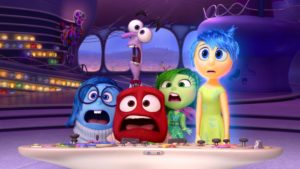Over the summer, Disney and Pixar were sued by childhood development expert Denise Daniels over the film Inside Out. She claims that the film was based on her TV show, The Moodsters, and that she was uncompensated for her work. As reported by The Hollywood Reporter, there are some similarities between the two films as both conceptualize the emotions as anthropomorphic characters that have a distinct color associated with them. In both properties, happiness was personified as a yellow character, sadness as a blue character and anger as a red character. Both properties also portray these characters as living deep within a child’s mind and depict how they control a child’s emotions. Daniel’s alleges in her complaint that she pitched the idea to Disney and Pixar every year from 2005-2009. She finished a pilot for The Moodsters in 2007 and took the pilot to Disney. Pixar released Inside Out in the summer of 2015.
Daniel’s is suing Disney for a breach of an implied-in-fact contract, claiming that she relied on the customary assumption in the entertainment industry that she would be compensated if Disney and Pixar ever used her ideas. She argues that because emotions are abstract, the anthropomorphization of these characters were her creation and she is the exclusive owner of those ideas. This lawsuit is similar to another lawsuit also from this past summer, where Esplanade Pictures claimed that writer Gary L. Goldman was uncompensated for the ideas he pitched to Disney, ideas that would eventually become the basis of Zootopia.
As reported by Law360, Disney moved to dismiss the case on November 17th, 2017, claiming that copyright protections only extend to characters under exceptional circumstances. For instance, characters like Batman and James Bond are protected by copyright because years of works depicting these characters have made them widely recognizable. As such, any traits used that are closely related to those characters could be protected under copyright law. Disney argues that the characters in The Moodsters are not instantly recognizable and therefore should not be offered protection under copyright law. Disney’s lawyers argue that Daniel’s did not invent the universal emotions of fear, happiness, and anger, and cannot claim to “have a monopoly” over depictions of those emotions as characters. Furthermore, in their exhibits, Disney points other movies and television shows made prior to The Moodsters that similarly personified emotions as anthropomorphic characters. The case is currently pending in the U.S. District Court for the Central District of California.
Adele Zhang is an Entertainment Highlight Contributor for the Harvard Journal of Sports and Entertainment Law and a current first year student at Harvard Law School (Class of 2020).
Photo: “A Total Gem- Inside Out Movie Review” by Bago Games is licensed under CC BY 2.0.

